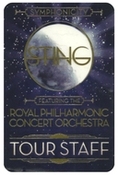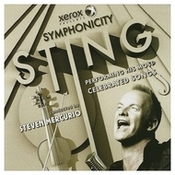
Sting plus strings equals excitement...
Sting first came to Boston in late 1978 with the Police. The trio played a multinight residency at the Rat, the dingy Kenmore Square basement punk club, and stayed at a cheap Kenmore Square hotel. WBCN was making 'Roxanne' a hit that would propel its singer into the stratosphere of fame.
Sting - now a trim, fit and debonair 58-year-old - recalled that first visit to Boston from the stage at Comcast Center on Thursday night. He is touring with the 45-member Royal Philharmonic Concert Orchestra (what he called ''the biggest band I've ever had in my life''), conducted by the exuberant Steven Mercurio. A backing rock quartet and singer Jo Lawry also contribute.
It is a galaxy away from a beer-soaked, pogo-ing Rat gig. But that Sting would go symphonic - and re-record part of his catalogue on his new 'Symphonicities' CD with the same orchestra - is hardly shocking. Considering Sting's musical explorations over the years, it seems almost inevitable that he would put his music in an orchestral context.
The crowd got more than two hours of crystal-clear music broken up into two sharply staged sets. It was a heaping dose of symphonic Sting, but the music retained elements of reggae, rock, blues and jazz.
There was both bombast and subtlety. 'Englishman in New York' was reminiscent of Frank Sinatra fronting Nelson Riddle's orchestra. 'Roxanne' was slow and sad, featuring a clarinet lead from Charys Green. The giddy rave-up of 'Every Little Thing You Do Is Magic' was carried by the strings section.
The second set got off to a languid start with a reworking of 'Every Breath You Take' that stripped the song of its ominous paranoia. But more often you had to tip your hat to the reimaginings and go with the sweeping sound. A towering ''King of Pain'' and the first encore, the Arabic-accented 'Desert Rose' - where Sting stepped away from the mike to swivel his hips and encouraged fans to dance along - were standouts.
Sting told many songwriting stories, such as how he came to write about aging foxes ('The End of the Game'), New Orleans vampires ('Moon Over Bourbon Street'), a transsexual prostitute ('Tomorrow We'll See') and Cold War anxiety ('Russians'). Before he played 'I Hung My Head', he noted that he felt validated as a country songwriter when Johnny Cash covered his tune.
And 'Next to You', the old fast and furious punker, did not sound silly. Even with orchestra, it rocked the house.
(c) The Boston Herald by Jim Sullivan
Sting first came to Boston in late 1978 with the Police. The trio played a multinight residency at the Rat, the dingy Kenmore Square basement punk club, and stayed at a cheap Kenmore Square hotel. WBCN was making 'Roxanne' a hit that would propel its singer into the stratosphere of fame.
Sting - now a trim, fit and debonair 58-year-old - recalled that first visit to Boston from the stage at Comcast Center on Thursday night. He is touring with the 45-member Royal Philharmonic Concert Orchestra (what he called ''the biggest band I've ever had in my life''), conducted by the exuberant Steven Mercurio. A backing rock quartet and singer Jo Lawry also contribute.
It is a galaxy away from a beer-soaked, pogo-ing Rat gig. But that Sting would go symphonic - and re-record part of his catalogue on his new 'Symphonicities' CD with the same orchestra - is hardly shocking. Considering Sting's musical explorations over the years, it seems almost inevitable that he would put his music in an orchestral context.
The crowd got more than two hours of crystal-clear music broken up into two sharply staged sets. It was a heaping dose of symphonic Sting, but the music retained elements of reggae, rock, blues and jazz.
There was both bombast and subtlety. 'Englishman in New York' was reminiscent of Frank Sinatra fronting Nelson Riddle's orchestra. 'Roxanne' was slow and sad, featuring a clarinet lead from Charys Green. The giddy rave-up of 'Every Little Thing You Do Is Magic' was carried by the strings section.
The second set got off to a languid start with a reworking of 'Every Breath You Take' that stripped the song of its ominous paranoia. But more often you had to tip your hat to the reimaginings and go with the sweeping sound. A towering ''King of Pain'' and the first encore, the Arabic-accented 'Desert Rose' - where Sting stepped away from the mike to swivel his hips and encouraged fans to dance along - were standouts.
Sting told many songwriting stories, such as how he came to write about aging foxes ('The End of the Game'), New Orleans vampires ('Moon Over Bourbon Street'), a transsexual prostitute ('Tomorrow We'll See') and Cold War anxiety ('Russians'). Before he played 'I Hung My Head', he noted that he felt validated as a country songwriter when Johnny Cash covered his tune.
And 'Next to You', the old fast and furious punker, did not sound silly. Even with orchestra, it rocked the house.
(c) The Boston Herald by Jim Sullivan
July 29, 2010
SET LIST
- If I Ever Lose My Faith In You
- Englishman In New York
- Every Little Thing She Does Is Magic
- Roxanne
- Straight To My Heart
- When We Dance
- Russians
- I Hung My Head
- Shape Of My Heart
- Why Should I Cry For You?
- Whenever I Say Your Name
- Fields Of Gold
- Next To You
- A Thousand Years
- Tomorrow We'll See
- Moon Over Bourbon Street
- End Of The Game
- You Will Be My Ain True Love
- All Would Envy
- Mad About You
- King Of Pain
- Every Breath You Take
- Desert Rose
- She's Too Good For Me
- Fragile
- I Was Brought To My Senses




